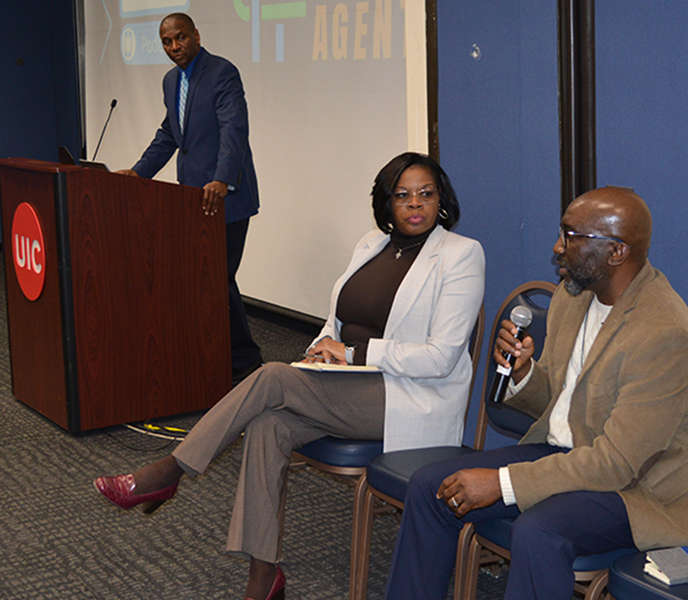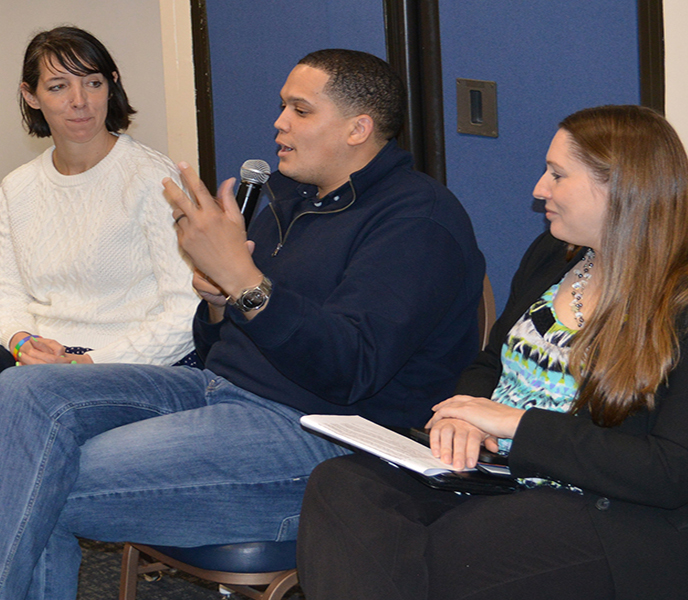Fighting for Freedom
JACSW Policy Center Forum Enlightens Formerly Incarcerated on Clearing Life’s Hurdles
Opening paragraphs Heading link

The roomful of men and women were able to come and go as they pleased, but many felt they were not truly free.
More than 650,000 incarcerated individuals are released from prison each year, and they face many barriers to re-enter society. Access to education is limited, job opportunities are negligible, civic engagement opportunities are scarce, and they are ineligible for public benefits, public housing, and student loans.
The Jane Addams College of Social Work’s Center for Social Policy and Research and the Illinois Coalition to End Permanent Punishments (ENDPP.org) convened a forum Feb. 15 to educate formerly incarcerated individuals on how they can clear the hurdles in their lives and become more involved in moving their lives forward.
“An arrest or conviction shouldn’t follow you for life,” said Gregory Chambers, director of policy for ENDPP.org who spent 28 years in prison. “If you have paid your debt to society you should be totally free.”
During a panel discussion moderated by Chambers, Willette Benford and Yaacov Delaney related how their lives have changed since leaving prison. Released from Dixon Correctional Center in 2019, Benford encountered a world that had dramatically shifted in the more than 20 years since her incarceration. Using a cell phone was foreign to her, as was navigating the internet. Instead of a prison cell her new residence was a transitional house, which is set up to convert residents to permanent, affordable housing. Numerous roadblocks caused Benford to believe that “re-entry was a myth.”
“The first time I applied for housing I was denied, and I was working for the city of Chicago,” said Benford, the first-ever director of reentry under former Chicago Mayor Lori Lightfoot.
“I don’t like the term that you have to prove yourself,” said Delaney, who spent more than 28 years behind bars and today serves as director of the Justice, Equity and Opportunity (JEO) Initiative within the Office of Illinois Lt. Gov. Juliana Stratton. “We did our time. We should be given a chance.”
Preparing for release
In prison, Delaney spent every waking hour preparing himself for his release. He was employed in the prison library, earned an associate degree, and completed paralegal and other vocational certifications. He also began advocating for prisoner rights and strategically researched solutions to remove systemic collateral consequences that were hindering formerly incarcerated individuals from becoming productive citizens. Due to his criminal record he cannot accomplish the one thing he aspires to do.
“I would like to become a notary public,” Delaney said. All states, however, bar those with felony convictions from receiving that designation.
Chambers quote Heading link
An arrest or conviction shouldn’t follow you for life.
Article continues Heading link

When Benford entered prison, sleeping occupied most of her days. A fellow inmate befriended her and suggested she needed to get up in the morning, develop a routine, and “get an assignment.” She felt hindered because of her ninth-grade education but she vowed to herself that education would be her salvation. She received her General Equivalency Degree (GED) and an associate degree, and certifications in restaurant management, cosmetology, and construction.
Today, Benford serves as senior advisor to Illinois First Lady MK Pritzker, working to advance women’s issues and the state’s justice portfolio. The goal, she said, is to reduce the number of women incarcerated within the Illinois Department of Corrections by providing preventative measures and resources upon reentry, while also ensuring humane and dignified treatment of those individuals directly impacted by incarceration.
Ready for Clean Slate
More than 2 million Illinoisans have a conviction record that is eligible to be cleared or expunged. However, only 10% have begun the costly and time-consuming process. More than 30 organizations have united as the Clean Slate Coalition to educate lawmakers and the public on ways to end permanent punishments. Paul Rothschild, director of operations for EndPP.org, asked a second group of panelists at the forum, consisting of Illinois lawmakers Rep. Lindsey LaPointe (D-19), Sen. Rachel Ventura (D-43), and Sen. Robert Peters (D-13), if they are ready for Clean Slate to be enacted. A resounding “yes” was heard from all three.
“This is an all of us thing,” said LaPointe, who received her master’s degree from the Jane Addams College of Social Work. The legislation has yet to be approved (Pennsylvania was the first state to pass such a law in 2019), but last year Illinois lawmakers consented to legislation that took effect on Jan. 1, 2024 that creates a more transparent supervision system that will lower recidivism, support communities, and reduce supervisor caseloads to better serve the individuals most at risk while still holding individuals responsible, said Gov. J.B. Pritzker in a news release.
The law promotes public safety and community success by implementing criminal justice reforms, including improving education credits incentivizing people on parole or mandatory supervised release (MSR) to obtain a degree, career certificate, or vocational technical certificate. It also streamlines early termination processes and increasing government transparency by standardizing review timelines, encouraging officers to recommend early termination for people who have a record of accomplishment of success, and providing clear feedback for those denied.
It also tailors supervision to an individualized approach to each person’s unique circumstances, focusing on addressing root causes of crime and enhancing public safety, while limiting unnecessary drug testing which saves resources and reduces work interruptions. The new legislation also permanently expands virtual reporting for remote check-ins for all forms of supervision in Illinois and removing barriers to success.
The Illinois Coalition to End Permanent Punishments was started by Marlon Chamberlain, who spent more than 20 years incarcerated. The group was created as an organizing and campaign hub for people directly impacted by the criminal legal system to come together, build a movement, and lead and implement advocacy campaigns to end the impact of a criminal record following people long after incarceration.
“We want our advocacy work to support and lift people up,” Chambers said. “We want to create and define a new narrative and put our resources and power behind them. We want to invest in people, not just issues.”